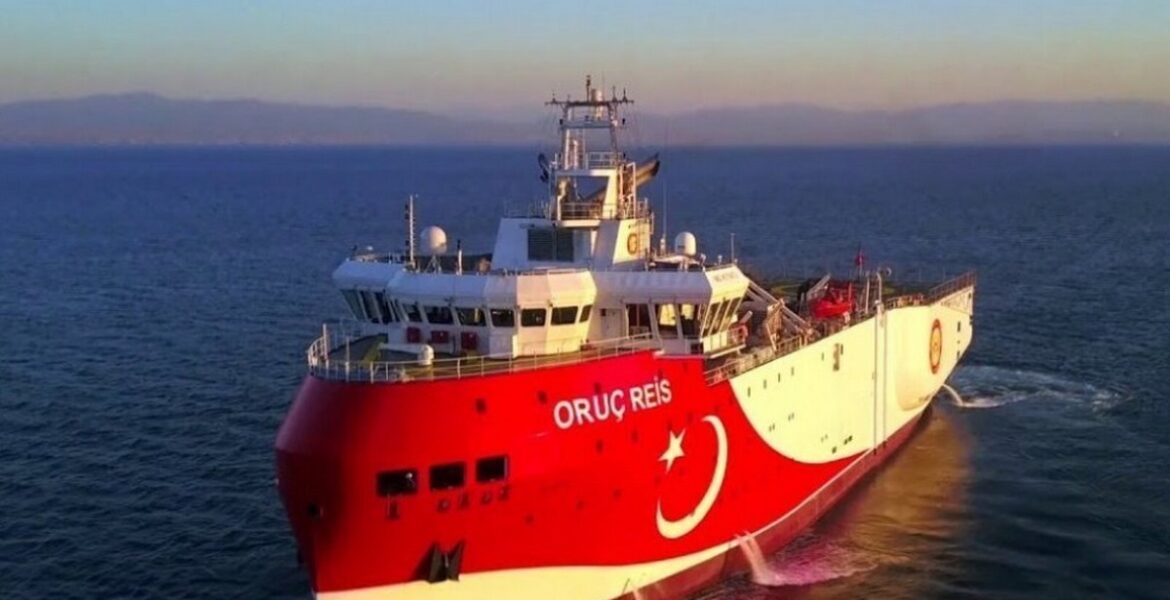Turkey faces countries that have hitherto maintained a favorably neutral stance towards it in bilateral disputes with Greece over the Oruç Reis, Proto Thema wrote.
With another Greek-Turkish crisis in full swing, the conclusions that can be drawn are many - both diplomatically and militarily. But it all stems from a common assumption: as much as Turkish foreign policy aims to embody grandiose visions, whether they include the acquisition of sea zones or even the acquisition of land territory at the expense of neighboring states, so will crises with neighboring countries of Turkey increase in both frequency and intensity.
Another conclusion that emerges from the previous assumption is that the policy of rupture chosen by Turkey, which has sharply raised the political thermometer in an already fragile part of the planet, the Eastern Mediterranean, is gradually being confronted with countries that until now held a favorably neutral - if not friendly - attitude towards the Turks in their bilateral disputes with Greece.
This trend is constantly intensifying and countries such as the UAE and Saudi Arabia are rushing to denounce Turkish provocation and aggression. The geopolitical situation is unfavorable as Turkey's intervention in Libya in favor of Muslim Brotherhood and ethnic Turk Fayez al-Sarraj, through the deployment of troops and equipment, has disturbed many Arab countries that see Turkey as a country that aspires to take the lead in political Islam, challenging and bypassing the traditional primacy of the Arabs as descendants of the Muhammad, the founder of Islam.
The conversion of Hagia Sophia into a mosque and the impressive claims by Turkish President Recep Tayyip Erdoğan to release Al-Aqsa Mosque did not bring Muslims everywhere on Earth to the Turkish chariot, but rather brought about the opposite effect. In fact, the recent Israeli-UAE agreement, unprecedented in historical terms, to improve their bilateral relations angered Turkey, which rushed to threaten the UAE by severing its diplomatic relations. It should be noted that both the UAE and Israel have clearly expressed their support for the Greek positions. In fact, at the political level, Israel strongly supports the Greek positions, as evidenced by the unequivocal condemnation by Israeli Foreign Minister circles of Turkish unilateral actions in the Eastern Mediterranean, proving in practice its ever-improving partnership with Greece.
But also our so-called traditional allies and partners intensify their voices and exert mainly diplomatic pressure, recognizing the law of the Greek positions and stigmatizing the destabilizing practices of Turkey. For example, the U.S. through Secretary of State Mike Pompeo, immediately after the meeting with his Turkish counterpart, called on Turkey to stop its illegal activities through naval research carried out by the Turkish research ship within the Greek continental shelf.
The EU, for its part, convened an extraordinary meeting of the Council of Foreign Ministers with the Turkish provocation being a top issue on the agenda of the meeting, where European solidarity with Greece and Cyprus was once again expressed. In addition, the EU sanctions list against Turkey is nearing completion, which is expected to be ratified at the end of August, during the forthcoming regular EU Member States' Summit.
In addition to its diplomatic initiatives, however, Greece moved quickly and militarily to curb Turkish aggression. Once again, within a few weeks, the Greek military immediately mobilized the Armed Forces, in the midst of summer and summer leave. The undertaking of the highest readiness in only a few hours, with Greece's Fleet "sailing in a relentless rush," squadrons of aircraft being ready, and our military units at Evros and the islands ready to shield every inch of Greek territory - they filled the Greek people with pride.
The second, in less than a month and given the circumstances, lightning reaction of the Greek military and the mobilization of the entire Armed Forces is certainly not accidental. It is a product of thorough planning that have been prepared for these emergencies.
The Greek Army spread throughout Greek territory from Ormenio to Kastellorizo and operating with high professionalism and composure, avoided the traps set by the Turks to escalate tensions. Our Fleet was provoked by the Turks but reacted calmly and absolutely decisively, proving the Greek navy avoided the traps set by the Turks.
Nevertheless, the initiatives of the Greek military leadership did not stop there. France, who has admittedly emerged as an ardent supporter of the Greek position, as well as peace and security in the Eastern Mediterranean and a steadfast ally against Turkish aspirations, sent its first navy ships to conduct joint training with the Greek Navy in the area that the Oruç Reis was conducting research. This was in order to promote naval power but also to send a loud message to those who dream of the aberrant distortion of the rules of international law towards them. The climax of this message, however, will take place with the planned joint training in the coming days, in which allies and partner countries have already expressed interest in participating,
The management of the crisis unfolding in the Eastern Mediterranean, one of a series of similar precedents, and possibly subsequent ones, has proved one thing. Diplomatic processes can lead to de-escalation, but not on their own. The international factor is important, but only combined with the message of determination conveyed by the Greek military leadership and the strong Armed Forces can lead to a favorable outcome and de-escalation for Greece's national interests.
And this was done once again by our Armed Forces, responding immediately and effectively to the urgency of the moment, giving the necessary supplies to the admittedly overactive Greek diplomacy at this time to manage the situation not from a position of weakness but from a position of strength. This is obviously a difficult situation that requires strong nerves, but as it turned out in practice, we have them and we can strengthen them even more if necessary.


